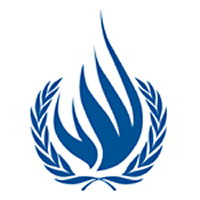 Amnesty International is mobilizing its members in the United States of America and around the world, calling on the U.S. government to support the formation of an effective new UN Human Rights Council. Amnesty International is mobilizing its members in the United States of America and around the world, calling on the U.S. government to support the formation of an effective new UN Human Rights Council.
"The U.S. administration should not jeopardize the best chance in decades to establish a more effective UN human rights body, " said Amnesty International Secretary General Irene Khan. "This historic opportunity must not be squandered, otherwise victims of human rights around the world will continue to suffer."
The UN General Assembly could act on a draft UN resolution that would establish the Human Rights Council as early as this week. However U.S. Ambassador to the UN John Bolton, who says he wants "improvements" in the draft resolution, has called for a renegotiation of the text or postponement of its consideration for a few months.
If the draft is reopened for negotiation, Amnesty International believes that there is a high risk that the text will be further weakened and result in a far less effective Council. If its adoption is postponed, negotiations could be indefinitely delayed or collapse altogether.
There is overwhelming support throughout the UN membership for the current draft resolution, most recently by the European Union. That text, which is the result of long and difficult negotiations, offers the best chance to replace the Commission on Human Rights with a new body better able to react swiftly to grave and chronic human rights violations. It also promises to ensure the election to the Council of a membership more committed to the promotion and protection of human rights than that of the Commission on Human Rights.
"The text is not perfect; it does not meet all the criteria we wanted, but it offers long-lasting and positive opportunities for better human rights protection. Calling for changes and threatening to put the resolution to a vote as the U.S. government has done just offers a few spoilers who don't want a stronger human rights system an opportunity to weaken the new body," said Ms Khan.
Amnesty International is calling on all governments to adopt the draft resolution without delay, thus realizing the commitment made by world leaders at the 2005 World Summit, including President Bush, to strengthen the United Nations' human rights machinery.
Available for interview:
Irene Khan, Amnesty International Secretary General, London
Contact: Katy Cronin +44 (0) 207 413 5729 +44 (0)7788 710 789
Yvonne Terlingen, Amnesty International UN representative, New York
Contact: Office + 1 212 867 8878 Mobile + 1 917 406 1185
Peter Splinter, Amnesty International UN representative, Geneva
Contact: Office +41 (0) 22 906 94 83 // 6137 Mobile +41 79 352 8302
BACKGROUND INFORMATION
The Commission on Human Rights has major achievements to its credit, however power politics and double standards have prevented the Commission from addressing widespread or serious human rights violations in many countries - leading to charges of selectivity and bias. This has led the UN Secretary-General and many other informed observers to conclude that the Commission suffers a "credibility deficit".
The draft resolution now before the General Assembly seeks to establish a new Human Rights Council better equipped to address urgent, chronic and other human rights situations than the current Commission.
The Commission only meets once a year for six weeks, while the new Council would meet at least three times a year for at least ten weeks and can more easily convene special sessions when needed, e.g. to address emerging human rights crises. In electing members, the General Assembly must take into account candidates� human rights records, and all members of the Council must have their human rights record reviewed in a new system of universal review applicable to all countries. Ninety-six affirmative votes are required to be elected to the Council, whereas many Commission members were elected as members of a regional bloc without facing individual votes. Serious human rights violators can be suspended from Council membership. The draft resolution also preserves key strengths of the Commission, including its unique system of independent experts known as Special Procedures, as well as the important arrangements and practices for NGO participation in its work.
The Council to be established by the draft resolution will not be as strong as Amnesty International had hoped. Many governments failed to follow through on commitments made in the 2005 World Summit to create a Council that would strengthen the UN�s human rights machinery. Nonetheless, Amnesty International believes that the adoption of the draft resolution is a first and crucial step to create a stronger and more authoritative body than the Commission on Human Rights. The draft resolution must not be further diluted and must now be adopted.
|